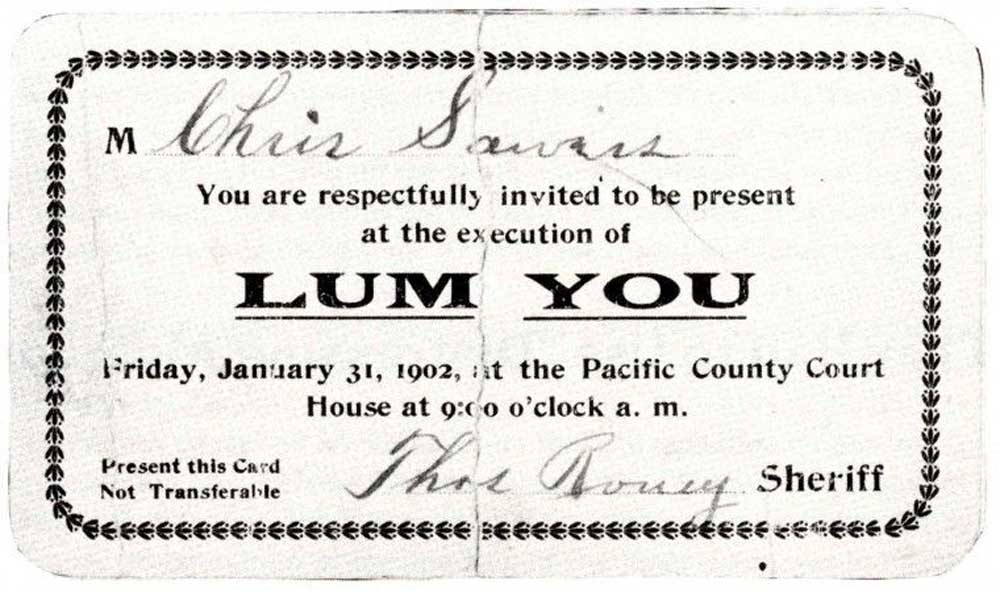Saints or Sinners? Characters of Pacific County: Lum You, sympathetic story of a hanged man
Published 10:38 am Saturday, September 9, 2023

- Prominent Pacify County citizens were issued invitations to the hanging so that they might witness that justice was served. Many of Lum You’s friends also attended hoping that he might see some friendly faces among the crowd. Ed Wickberg long recalled, with a shudder, that it was a terrifying spectacle for him, a young boy, to witness. He was one of a group of lads summoned to the scene by Sheriff Roney, who believed that in this way the horrible experience of being an eye-witness to a hanging would be remembered for many decades, and thus serve as a crime deterrent.
Many Chinese were living in Pacific County at the turn of the 20th century. They provided the work crews for the canneries and cranberry bogs.
One of the best known was Lum You. He was a unique character, and said to be “something of a dandy.” He carried himself proudly. His immaculate clothing was of English cut and he wore jade bracelets and a long queue into which he braided a length of fine China silk and decorated the end with an ornate tassel. A jolly, sociable fellow who always had a story or exotic tidbit for the little ones, Lum was well-liked by both Chinese and Whites.
Previous to the trouble which ended in Lum’s hanging, he had a run-in with another Chinaman. Lum complained to Marion Egbert, chief of police in South Bend. “Don’t come to me with your Chinaman troubles!” Chief Egbert told him. “I don’t care what you do. You can chop off his head if you want to!”
Well, Lum wanted to! And Ging had the scar to prove it. This put an abrupt end to Lum’s “Chinaman Troubles” but on Aug. 6, 1901, Oscar Bloom (who was a big man) bumped into the smaller man as they passed in the street. Lum was not happy with this occurrence but decided to let the incident pass
Later, Bloom tipped over Lum’s chair and knocked the cards from his hands. Lum let that pass, too, but the fact that he held a winning hand did not set too well with the fiery Chinese. One witness said, “I saw Oscar Bloom reach into Lum You’s clothing and remove his valuables which included a watch and several dollars in gold and silver coins. After Bloom had thrown the defendant to the ground, he made several threats against the Chinaman’s life.”
Lum knew he must not complain to Chief Egbert again. “Me go to room. Put one bullet into gun. Follow Bloom and shoot at him. Then go home.” Although neighbors heard the shots, no one went to investigate and Bloom, mortally wounded, was not found until the next day.
Immediately the wheels of law and order were put into motion. Word was sent to South Bend where police Chief Egbert engaged the steamer Flora Brown to take him, Dr. Gruwell, and County Officials to the scene of the crime in Bay Center. They arrived a short 23 hours after the shooting. Notary Public L.L. Bush took down Bloom’s deathbed statement:
“Last evening in the neighborhood of 9 o’clock I was on the street and may have had some words with Lum You, a Chinaman. As to the matter of words, however, I do not recall… My recollection is clear to all events of assault, though not as to what may have occurred in the street before.”
While the sympathies seem to have been with Lum You, local employers of Orientals insisted that “action be taken against this Chinese who had dared to harm a White man!” The trial was held in October 1901. The jury’s first ballot was 11 to 1 for acquittal. That one man held out so stubbornly that the other 11, weary with arguing, eventually voted for conviction.
Jurors, believing that Lum You would receive a light sentence, were stunned at the verdict: “It is the decision of this court that you, Lum You, having been convicted of murder, be hanged by the neck until dead.”
‘It is the decision of this court that you, Lum You, having been convicted of murder, be hanged by the neck until dead.’
The sheriff left the cell door unlocked at night and encouraged, even ordered, Lum You to flee, but Lum feared the disgrace of deportation to China and possible beheading even more than the hangman’s noose. “Cut off head, lose queue, me no go to heaven. All my family, all my ancestors be shamed.”
When Lum You was brought into the execution room, he bowed low and spoke to the crowd. “Good-by everybody, all my friends, women and men, wish me all good luck. Me ready to die.” Then a hood was placed over his head and he said, “Me no can see. Kill me good.”
Sheriff Roney had not made arrangements for Lum’s burial, so his deputy provided a gravesite on his property, close to the county road where friends could come conveniently to visit. The grave has few visitors now, but thoughts of that black day of Jan. 31, 1902, return when the site of the first courthouse in South Bend is referred to as “Hangman’s Park.”









